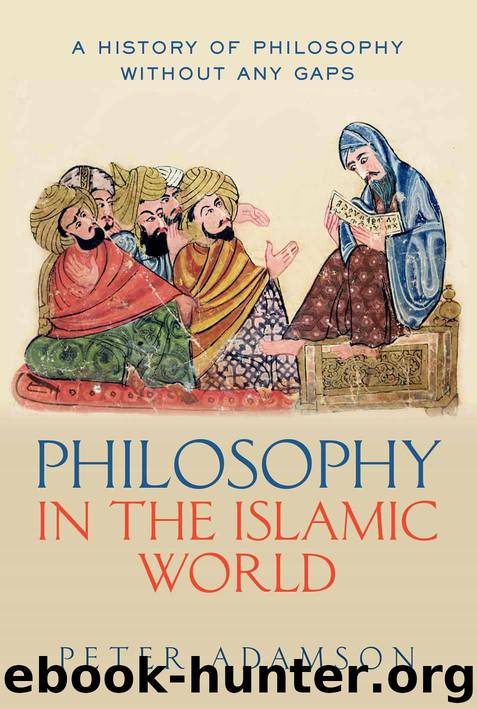Philosophy in the Islamic World: A history of philosophy without any gaps, Volume 3 by Peter Adamson

Author:Peter Adamson [Adamson, Peter]
Language: eng
Format: epub
ISBN: 9780198779445
Publisher: OUP Oxford
Published: 2016-06-26T20:00:00+00:00
37
Neither the Time Nor the Place Ḥasdai Crescas
In the construction business, they’ll often dynamite an old building to make room for a new one, and something similar has often happened in the history of science. We’re still some centuries away from the rise of modern physics, but in this chapter we’ll be looking at someone who helped clear the ground so that modern physics could be built. His name was Ḥasdai Crescas. The writings of Maimonides and Gersonides provoked him into a stunning assault on the assumptions underlying Aristotelian physics. His criticisms were not wholly new. Some are prefigured in Ibn Bājja and earlier still in the late ancient Christian critic of Aristotle, John Philoponus. But Crescas went further than them, both in the daring of his arguments and in his historical reach. Though his daring physical speculations caused little excitement among Jews in the following generations, he would be cited by Renaissance philosophers like Pico della Mirandola and later still by Spinoza.1 It would be going too far to say that without Crescas there would have been no modern science. But it would not be going far enough if we failed to credit Crescas with some part in the gradual demise of Aristotelian science.
As scientific revolutionaries go, Crescas cut a somewhat unlikely figure. For one thing, his intentions concerning natural philosophy were mostly destructive. He was more demolition man than architect. Yet, in arguing that Maimonides and Aristotle had failed to rule out such things as void and actual infinity, he was indirectly led to contemplate possibilities that had been almost universally rejected since antiquity. For another thing, Crescas led a life dominated more by the discontents of his people than the contents of Aristotle’s Physics.2 He hailed from Barcelona, where he rose as a scholar at the city’s yeshiva. This was in the mid- to late fourteenth century, so we are talking here about Spain under the rule of Christians after the reconquest. Christian rule was, during this period, rather favorable to Jews in general, and to Crescas in particular. He moved to Saragossa, capital of Aragon, and the king and queen appointed him as the highest legal authority for Jews in their realm.
Then, in the year 1391, disaster struck. It came in the form of pogroms against the Jews in many Spanish cities, with the Christian authorities incapable of checking the violence.3 The Jewish community of Crescas’ former home in Barcelona was destroyed, and Crescas’ own son was killed there. Many thousands of Jews were massacred, and there was an unprecedented mass conversion, with a staggering number of others becoming Christian to avoid martyrdom. This calamity was a foretaste of what would come almost exactly a century later, with the total expulsion of Jews from Spain. As a high-ranking Jewish leader, Crescas worked to find safe havens for his co-religionists. He also went on the offensive against the Christians, at least in writing. Among his works is a treatise, written in Catalan, which criticizes ten principles of
Download
This site does not store any files on its server. We only index and link to content provided by other sites. Please contact the content providers to delete copyright contents if any and email us, we'll remove relevant links or contents immediately.
| Buddhism | Christianity |
| Ethnic & Tribal | General |
| Hinduism | Islam |
| Judaism | New Age, Mythology & Occult |
| Religion, Politics & State |
Cecilia; Or, Memoirs of an Heiress — Volume 1 by Fanny Burney(31332)
Cecilia; Or, Memoirs of an Heiress — Volume 3 by Fanny Burney(30934)
Cecilia; Or, Memoirs of an Heiress — Volume 2 by Fanny Burney(30889)
The Secret History by Donna Tartt(16618)
Sapiens: A Brief History of Humankind by Yuval Noah Harari(13047)
Leonardo da Vinci by Walter Isaacson(11901)
The Radium Girls by Kate Moore(10906)
Sapiens by Yuval Noah Harari(4534)
The Wind in My Hair by Masih Alinejad(4424)
How Democracies Die by Steven Levitsky & Daniel Ziblatt(4397)
Homo Deus: A Brief History of Tomorrow by Yuval Noah Harari(4276)
Endurance: Shackleton's Incredible Voyage by Alfred Lansing(3839)
The Silk Roads by Peter Frankopan(3758)
Man's Search for Meaning by Viktor Frankl(3630)
Millionaire: The Philanderer, Gambler, and Duelist Who Invented Modern Finance by Janet Gleeson(3568)
The Rape of Nanking by Iris Chang(3514)
Hitler in Los Angeles by Steven J. Ross(3435)
The Motorcycle Diaries by Ernesto Che Guevara(3332)
Joan of Arc by Mary Gordon(3257)
